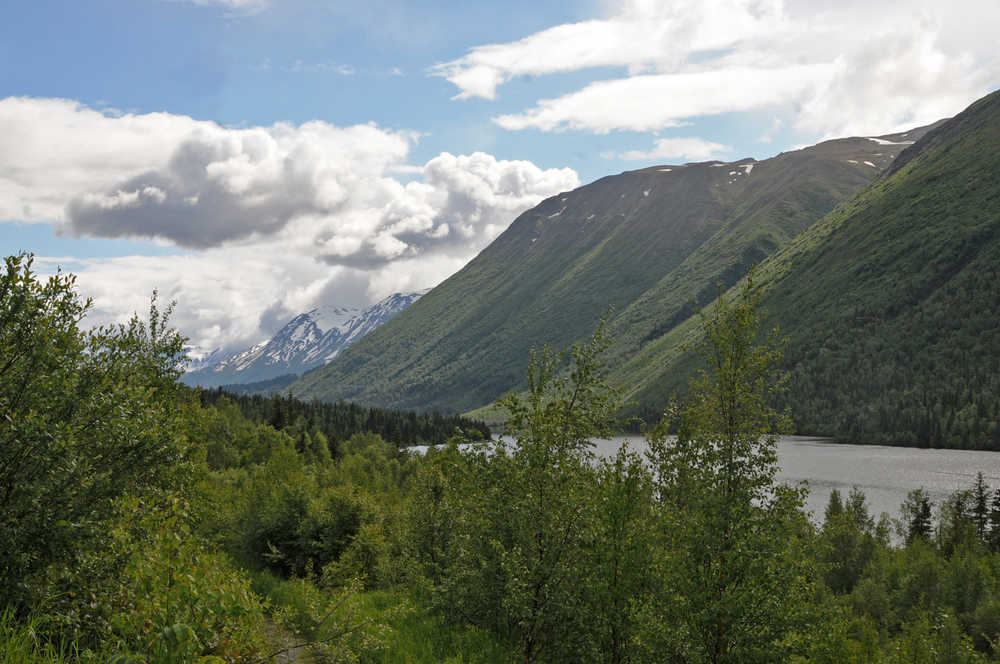Editor’s note: This article has been corrected to show that Trout Unlimited is represented on the Kenai Peninsula Fish Habitat Partnership steering committee but the Alaska Legislature is not.
Cook Inletkeeper is gathering more data on one of the most-loved rivers on the Kenai Peninsula, the Russian River.
The Homer-based conservation organization recently installed its first temperature monitoring station on the river, a snow-fed tributary of the Kenai River that flows through the Chugach National Forest and joins the river just west of Cooper Landing. Every year, thousands of anglers flock to the confluence of the Kenai and Russian rivers to fish for the sockeye salmon that return to spawn there.
The station feeds real-time temperature data to Cook Inletkeeper. The public can access it on the organization’s website and track it day-by-day, along with data from two other stream temperature monitoring stations on the Anchor River on the southern Kenai Peninsula and the Deshka River in the Mat-Su Valley.
The Russian River will provide data on a stream system that has lakes in it, which behaves differently than the Deshka and the Anchor, said Sue Mauger, science director for Cook Inletkeeper. The influence of Upper and Lower Russian lakes likely keeps the stream warmer later because larger water bodies take a longer time to shed their heat from earlier in the year, she said.
The Russian is also a higher system that doesn’t feed directly into Cook Inlet and may stay colder in the summertime than the other two systems, depending on the snowpack levels in the mountains. Snow levels vary and affect both the levels and temperatures of the rivers that depend on them. Last year, there was little snow in the lowlands but above-average snowpack in the mountains, which led to elevated stream levels throughout the season, which anglers noticed because of the additional difficulty in fishing.
Cook Inletkeeper has been running the temperature project since 2008 and tried to pick streams that anglers visit frequently, Mauger said.
“We know that snow levels are variable from year to year, and it will help us sort of understand what that changing snowpack is doing to our river temperature,” she said. “Especially for a loved and well-fished river.”
The monitoring station is stationed below Lower Russian Lake but above the Russian River Falls, where many visitors go to watch the salmon jump in the summer. The U.S. Forest Service and the Kenai Watershed Forum helped out picking a spot for the sensor, making sure there was enough sunlight to power the station, Mauger said.
The Kenai Watershed Forum helped sponsor the project through the Kenai Peninsula Fish Habitat Partnership, a part of the National Fish Habitat Partnership, which provides grants for fish habitat restoration and improvement projects. The Kenai Watershed Forum coordinates it, but the steering committee includes members from the Alaska Department of Fish and Game, Trout Unlimited, the Kachemak Heritage Land Trust, the U.S. Fish and Wildlife Service, the National Oceanic and Atmospheric Administration, the Kenai Peninsula Borough and the U.S Forest Service. Mauger is also a member of the committee.
The Russian River project will provide additional numbers for the ongoing data project Cook Inletkeeper has been working on, showing the impact of changing stream temperatures on the fish living in those streams. In spring 2017, the Canadian Journal of Fisheries and Aquatic Sciences will publish a paper that Mauger and several colleagues wrote compiling the data on stream temperatures of 48 non-glacial salmon stream systems across the Cook Inlet basin.
Stream systems between 2008 and 2012 were consistently warmer than their historical temperatures, exceeding 13 degrees Celsius. When their habitats exceed that temperature, salmon begin to experience thermal stress, according to the report, which has already been published on the journal’s website.
Projections of the maximum weekly maximum temperature on the streams project that the trend is likely to continue, according to the report. Mauger said the report was meant to link what the researchers are observing now with warmer water temperatures to the outlook for salmon in southcentral Alaska in the next half-century.
She said real-time data can be helpful and provide immediate perspectives, rather than having to wait months to crunch data after the fact.
“I really think it’s important to have real-time data to look at,” she said. “We learn a lot when we have pieces of information at the same time.”
The Russian River’s temperature readings, as well as those from the Anchor and the Deshka rivers, can be viewed on Cook Inletkeeper’s website, www.inletkeeper.org.
Reach Elizabeth Earl at elizabeth.earl@peninsulaclarion.com.

